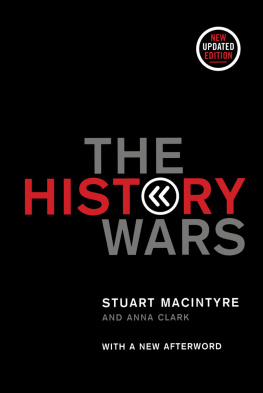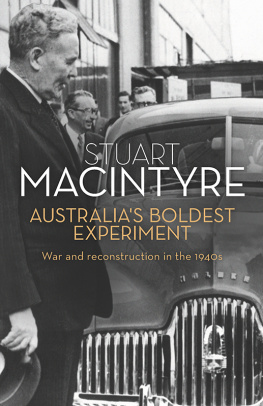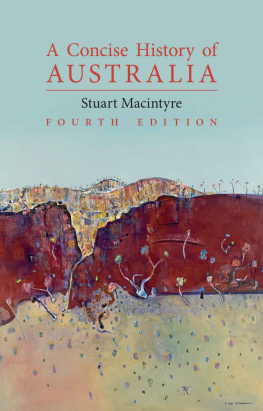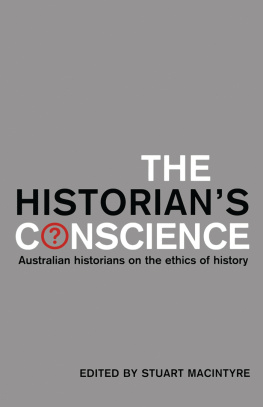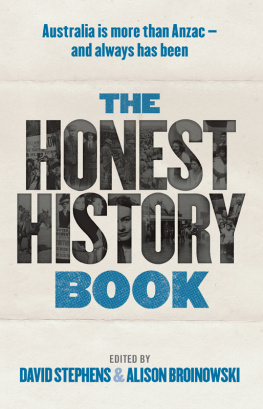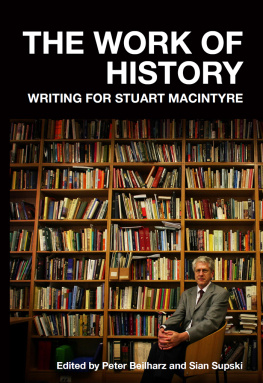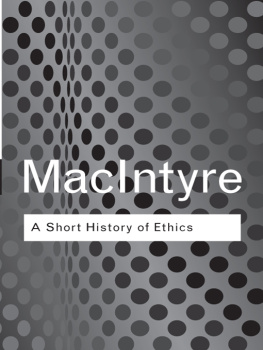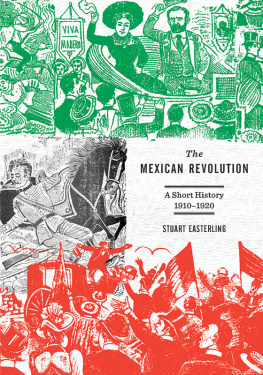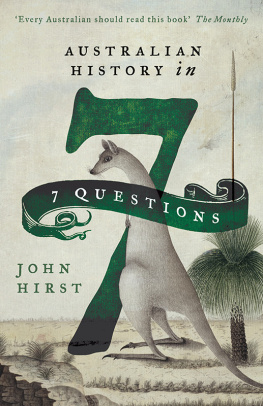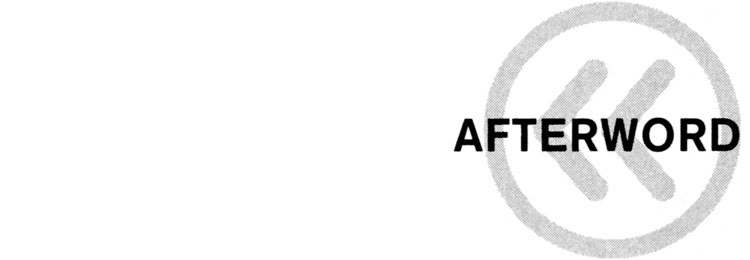ACKNOWLEDGEMENTS
I have been helped in the preparation of this book by a number of friends and colleagues who gave me material, testimony, information and encouragement. They include Alan Atkinson, Fay Anderson, Tony Birch, Geoffrey Bolton, Frank Bongiorno, Verity Burgmann, Michael Cathcart, Sebastian Clark, Cathie Clement, Ann Curthoys, Joy Damousi, Kate Darian-Smith, Graeme Davison, John Fitzgerald, Ross Fitzgerald, Stephen Foster, Raelene Frances, Robert French, Tom Griffiths, Patricia Grimshaw, Paula Hamilton, Gerard Henderson, John Hirst, Les Holmes, David Hutchinson, James Jupp, Diane Langmore, Mark Lindsay, Martha Macintyre, Michael McKernan, Nicole McLennan, Rob Pascoe, Michael Piggott, Penny Ramsay, Beryl Rawson, Andrew Reeves, Keir Reeves, Tim Rowse, Kay Saunders and Peter Steele. John Faulkner, John Hirst and Don Watson read drafts and made helpful suggestions. While many provided ingredients, the broth is my own.
The book would not have been written without the encouragement of Louise Adler, who persuaded me to put my other projects on one side. It could not have been written without Anna Clark. She has previously made a study of the Black Armband debate and is currently engaged on a doctoral research project in school history. In addition to contributing a chapter on that subject, she put her research at my disposal, hunted out additional material and was an exemplary supervisor of my own research.
Stuart Macintyre
A number of friends and family read drafts of my chapter and gave much-needed advice. I am especially indebted to Becky Batagol, Simon Booth, Alison Clark, Tom Clark, Cate Elkner, Maya Haviland and Clare Wright. Thanks also to Stuart for allowing me to contribute a small portion of my own work in what has been a large portion of his. And to my father Axel for his love and support, who didnt live to see this book but who would have had a bit to say.
Anna Clark
This book is concerned with history and politics, with the way that historians interpret the past and the political controversies over different interpretations of Australian history. As Anna Clark and I Completed our manuscript, we asked Senator John Faulkner to give us the benefit of his forensic command of detailthough I worried when he told me that he would have to read the manuscript during sessions of the Senate estimates committees. Im not sure which government department might have benefited from his inattention, but he emerged with some prescient advice. Be prepared, he said, for when this book appears they will go for you.
His prophecy was sound. As I sat down to breakfast on the morning of the book-launch and peeled the cling-wrap from the newspapers, my eye was caught by a large item on the features page of the Australian. The opening paragraph presented me as the man who would be, and has largely succeeded in becoming, the godfather of the history profession in Australia. The author was Greg Melleuish, an Associate Professor in the Department of History and Politics at the University of Wollongong, and he went on to suggest that I possess an inordinate control of the teaching of history.
Despite the warning, I was surprised that Greg Melleuish should appear as a witness for the prosecution. Though not close, we had briefly been colleagues in the Melbourne History Department, and in his next academic post he had sought and received my advice. It was less surprising that the Australian should carry his diatribe. I had already received a letter from this newspaper that sought to correct a few misapprehensions in my account of the Courier-Mails attack on Manning Clark in 1996.
The letter came from Wayne Smith, who had been the principal journalist in preparing that remarkable eight-page feature alleging that Clark had been a Soviet agent; he followed its editor down to the Australian after Chris Mitchell became editor-in-chief of the national newspaper. Wayne Smith now writes on Rugby Union, but he explained to me that he had not been a sports writer in Brisbane, as I described him, but an assistant editor who wrote features as well as sports stories. That was the only one of the supposed misapprehensions he listed to withstand scrutiny; the rest of his letter, which was civil in tone, took issue with facts that were on record and in any case had been adjudicated by the Press Council.
Greg Melleuish provided the Australian with a pre-emptive attack on my character and professional standing. In the course of his article he observed that I chair the Humanities and Creative Arts panel of the Australian Research Council, and also that my own Faculty of Arts at the University of Melbourne received more than a quarter of the grants awarded in 2002 for research in historical studies. Coupled with his claim that I exercise such influence over the history profession, the implication was clear. At the launch, later on the same day, I was therefore able to say that I was indebted to the newspaper for such a striking illustration of the tactic of the History Wars that the book decried: denunciation and personal abuse.
Very soon I began to receive messages from colleagues around the country with whom I work on the Australian Research Councils disciplinary panel. They reported inquiries from a journalist working for the Australian who wanted to do a follow up story on Greg Melleuishs allegations. I hope I am not doing her a disservice when I say that the journalist in question, Kate Legge, undertook the task in a remarkably even-handed fashion. She even drew a statement from Greg Melleuish that he had been an applicant for Australian Research Council grants, received one, been knocked back on another and lost faith in the system. He might have been expected to declare this personal interest in his own article.
On the weekend after the launch the newspaper carried a review of The History Wars. The choice of reviewer was all too predictable. Week in and week out, Peter Ryan and Peter Coleman appear in the review pages of the Australian, passing equally predictable judgement on books of Australian history, politics and current affairs. You sometimes wonder whether the editor of the Review section has issued a standing instruction give it to Peter, and one or the other of them opens that weeks parcel of the new non-fiction. In this case they divided the spoils. Peter Coleman reviewed Robert Marines collection of essays on Keith Windschuttle, Whitewash, and Peter Ryan reviewed The History Wars. Both assignments offered a free kick to the History Warriors.
The literary editor of the Age had asked me if I would review Robert Mannes book and I had declined on the grounds that I am too close to the subject to offer an independent appraisal. No such scruples inhibited Peter Ryan, and the sub-editor drew attention to the fact with an introductory passage that described him as a combatant in Australias war of the historians. Ryan was far too generous with his insultsI was a presiding academic presence over the black armband era of Australian history writingbut here he was well below his best form.
Ryan also repeated his earlier warning that I should not come within arms length of him. My chief ambition had been to get him in some lesser proximity, onto a platform or into a studio, to debate his shameful posthumous betrayal of Manning Clark, but he has steadfastly resisted all invitations to do so.
This turned out to be a recurrent trait of the History Warriors who lined up to have their say in the Australian. Christopher Pearson used his column in the same weekend edition to scatter insults, but he had withdrawn from a panel debate on Radio Nationals Late Night Live in the previous week. Janet Albrechtsen agreed to a debate with me at the Sydney Institute and then withdrew because of a family illness, but that did not stop her from using her column in the Australian to announce that history is too important to be left to historians like Stuart Macintyre who want to shut down political debate.

